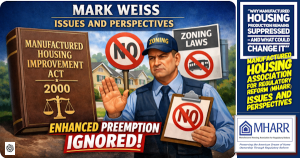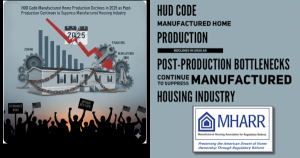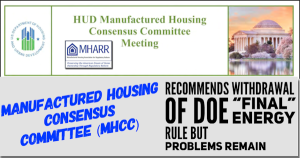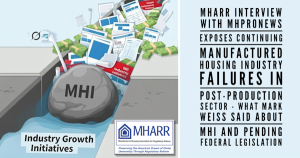‘Stunning and Unworkable’ – DOE’s Extreme Energy Enforcement Regulations Would Destroy Affordable Manufactured Homes
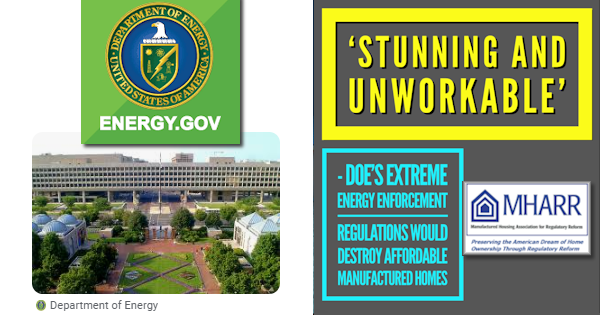
DECEMBER 12, 2023
TO: HUD CODE MANUFACTURED HOUSING INDUSTRY MEMBERS AND CONSUMERS
FROM: MHARR
RE:DOE’S EXTREME ENERGY ENFORCEMENT REGULATIONS WOULD DESTROY AFFORDABLE MANUFACTURED HOMES
At a time when the entire nation and governments at all levels are desperately seeking to find ways and means to provide affordable housing for American homebuyers, the U.S Department of Energy (DOE) — in keeping with its consistent track record of extremism and bad faith with respect to manufactured housing energy regulation – has just published a stunning and unworkable energy enforcement regulation that would undermine and destroy today’s most affordable unsubsidized manufactured homes.
DOE, under the Energy Independence and Security Act of 2007 (EISA), has proposed enforcement and compliance procedures for its previously-published federal manufactured housing energy standards that would establish a high-cost de facto “star chamber” system for the enforcement of those standards. This system, moreover, would be separate from – and in addition to – HUD’s already existing enforcement system for the Part 3280 Federal Manufactured Housing Construction and Safety Standards (FMHCSS) .
Under the pre-publication enforcement notice issued by DOE on December 8, 2023 (see, copy attached) manufacturers would have the burden to affirmatively prove compliance with the pending final DOE standards upon any inquiry by DOE, subject to extreme civil penalties based upon the purported number of violations in each home produced by the manufacturer, with no cap or limit. This would appear, on initial review, to turn the standard burden of establishing an alleged violation on its head, with manufacturers being required to prove a negative – i.e. a non-violation – instead of DOE being required to prove and establish (at least initially) a claimed violation based upon some level or standard of proof, such as a preponderance of the evidence.
In addition to the fundamental unfairness of this proposed process – and its destruction of the constitutional due process rights of manufacturers – DOE, as anticipated and predicted by MHARR, also maintains, unbelievably, that it would entail little or no additional regulatory compliance costs for manufacturers. As a result, the pre-publication notice contains no analysis whatsoever of the cost-benefit parameters of the proposed enforcement regulations, either in isolation or in conjunction with the substantive energy standards already adopted. As such, the proposed rule, as a whole, fundamentally fails the most basic test and essential requirement for federal regulation – that the benefits of any regulation exceed its expected costs.
This enforcement rule must now be stopped by addressing it in the Manufactured Housing Institute’s (MHI) pending federal litigation concerning the DOE energy standards. It bears reiterating, though, that the industry could have avoided this entire energy fiasco if only MHI had not “gone along to get along” when this issue initially surfaced. Unfortunately, though, MHI did go along at crucial junctures and now has a responsibility to the industry and consumers to take every necessary and proper action to stop this destructive regulation.
MHARR will continue to closely monitor this proceeding and inform the industry and consumers accordingly. Further, MHARR will submit responsive comments in advance of the filing deadline which will be made available to all industry members, and encourages all industry members and consumers to submit comments opposing this destructive rule. The deadline for comments will be sixty (60) days following formal publication of the proposed enforcement regulations in the Federal Register.
Attachment

Manufactured Housing Association for Regulatory Reform (MHARR)
1331 Pennsylvania Ave N.W., Suite 512
Washington D.C. 20004
Phone: 202/783-4087
Fax: 202/783-4075
Email: MHARRDG@AOL.COM
Website: www.manufacturedhousingassociation.org
DECEMBER 12, 2023
TO: HUD CODE MANUFACTURED HOUSING INDUSTRY MEMBERS AND CONSUMERS
FROM: MHARR
RE:DOE’S EXTREME ENERGY ENFORCEMENT REGULATIONS WOULD DESTROY AFFORDABLE MANUFACTURED HOMES
At a time when the entire nation and governments at all levels are desperately seeking to find ways and means to provide affordable housing for American homebuyers, the U.S Department of Energy (DOE) — in keeping with its consistent track record of extremism and bad faith with respect to manufactured housing energy regulation – has just published a stunning and unworkable energy enforcement regulation that would undermine and destroy today’s most affordable unsubsidized manufactured homes.
DOE, under the Energy Independence and Security Act of 2007 (EISA), has proposed enforcement and compliance procedures for its previously-published federal manufactured housing energy standards that would establish a high-cost de facto “star chamber” system for the enforcement of those standards. This system, moreover, would be separate from – and in addition to – HUD’s already existing enforcement system for the Part 3280 Federal Manufactured Housing Construction and Safety Standards (FMHCSS) .
Under the pre-publication enforcement notice issued by DOE on December 8, 2023 (see, copy attached) manufacturers would have the burden to affirmatively prove compliance with the pending final DOE standards upon any inquiry by DOE, subject to extreme civil penalties based upon the purported number of violations in each home produced by the manufacturer, with no cap or limit. This would appear, on initial review, to turn the standard burden of establishing an alleged violation on its head, with manufacturers being required to prove a negative – i.e. a non-violation – instead of DOE being required to prove and establish (at least initially) a claimed violation based upon some level or standard of proof, such as a preponderance of the evidence.
In addition to the fundamental unfairness of this proposed process – and its destruction of the constitutional due process rights of manufacturers – DOE, as anticipated and predicted by MHARR, also maintains, unbelievably, that it would entail little or no additional regulatory compliance costs for manufacturers. As a result, the pre-publication notice contains no analysis whatsoever of the cost-benefit parameters of the proposed enforcement regulations, either in isolation or in conjunction with the substantive energy standards already adopted. As such, the proposed rule, as a whole, fundamentally fails the most basic test and essential requirement for federal regulation – that the benefits of any regulation exceed its expected costs.
This enforcement rule must now be stopped by addressing it in the Manufactured Housing Institute’s (MHI) pending federal litigation concerning the DOE energy standards. It bears reiterating, though, that the industry could have avoided this entire energy fiasco if only MHI had not “gone along to get along” when this issue initially surfaced. Unfortunately, though, MHI did go along at crucial junctures and now has a responsibility to the industry and consumers to take every necessary and proper action to stop this destructive regulation.
MHARR will continue to closely monitor this proceeding and inform the industry and consumers accordingly. Further, MHARR will submit responsive comments in advance of the filing deadline which will be made available to all industry members, and encourages all industry members and consumers to submit comments opposing this destructive rule. The deadline for comments will be sixty (60) days following formal publication of the proposed enforcement regulations in the Federal Register.
Attachment

Manufactured Housing Association for Regulatory Reform (MHARR)
1331 Pennsylvania Ave N.W., Suite 512
Washington D.C. 20004
Phone: 202/783-4087
Fax: 202/783-4075
Email: MHARRDG@AOL.COM
Website: www.manufacturedhousingassociation.org

